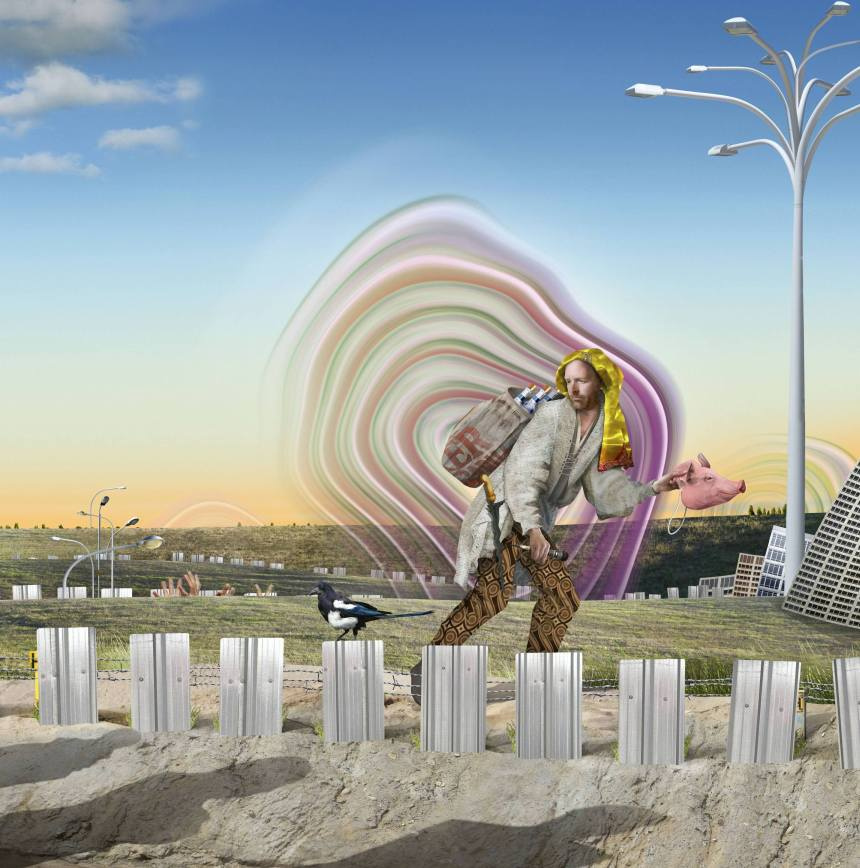Where have all the awkward bastards gone, the square pegs in round holes, those who willfully follow difficult paths, to their own detriment, in a time where society at large, not just music, is increasingly conformist, commodified, and keeps calm as it carries on? In a careerist age, there seem to be too many who’d compromise rather than jack it all in if they can’t realise their vision. Daniel Patrick Quinn, then, is a rarity in his generation. He was first heard on the self-released Ridin’ The Stang, an album of drones and curious narration by Quinn and, on one song, ancient Edinburgh museum guide Duncan Grahl reciting the story of the Burryman, a folklorish figure dressed in burrs who walks the streets of South Queensferry every August. That record of un-traditional folk music also featured ‘Northern’, a glorious, shimmering ode to the wild landscape between the Lake District and the Pennines that remains a personal favourite song of the last decade.
Sick of not getting anywhere alone, Quinn moved to London and formed One More Grain, whose two albums Pigeon English and Isle Of Grain furthered his own otherworldly pastoral aesthetic (memorably described by David Stubbs in The Wire as sounding like "a pheasant shoot with laser guns") with the addition of the treated brass of Dr Andrew Blick (subsequently heard in the brilliant Gyratory System). Frustrated at a world that seemed to prefer simpler fare – One More Grain were once supported by Wild Beasts and the XX – in 2008 Quinn turned his back on music, sold his equipment, and went to teach English and climb volcanoes in Indonesia.
Yet here we are with a second self-released (via Bandcamp, above) Daniel Patrick Quinn solo album, Acting The Rubber Pig, seven tracks based on sketches begun before his ‘retirement’, and completed in a cheap Jakarta recording studio shortly before his return to Europe earlier this year. Acting The Rubber Pig is a title that, like many on this wonderful, bizarre album, suggests a world both arcane and modern, full of mischief and, perhaps, madness. That dislocation, perhaps reflecting Quinn’s own meandering existence – is a theme is clear from the off. The cry of a seagull is the first sound heard on ‘Cornwall In Java’ (‘Surrey In Java just wouldn’t have worked), Quinn’s Lancashire vocals interjecting fragments of speech – "insects moving at right angles", "come with me to the shoreline" over a Juno synthesiser fizz, and what sounds like a sheep trying to beatbox before Blick layers over a gloriously bright-eyed trumpet melody.
Who knows what ‘Socratic Linedancing’ might be, but sign me up, for the second track on the ‘Pig’ is an abstract funk number, German experimentalism exported to the tropics as Quinn and another voice seemingly stuck in a never-ending narrative loop: "I hear they have a wine lake and a cheese mountain" "that’s right we’ve got a wine and a cheese mountain", and mentions of "Scotch Corner Hotel" and 1984‘s Winston Smith. A pitched up voice provides part of the rhythm, shrilly repeating "walking backwards", reedy melodies adding to a sense of the disquiet. It speaks of someone, or people, lost in an imaginary landscape ("who does it name its major roads after?" Quinn asks at one point) that’s as much in the mind as external – the road walked by Vladimir and Estragon in Waiting For Godot, perhaps, or the not-quite-right setting for Flann O’Brien’s The Third Policeman. As the lyrics mutter, "inventing an alternative geography of the Outer Hebrides… you can create your own map".
This sense of discombobulation is so internalised that I think it’d be a mistake to describe Acting The Rubber Pig as an exercise in rural psychogeography, or landscape music. It’s fringe of consciousness stuff, anxiety, depression, intoxication, bumbling across the grid lines and OS references of the mind. At times, on the rising drones of ‘Red Dial’, or the contrast between stoned musical atmospheres and shrill birdsong chatter on ‘Like Where The Starlings On The Telegraph Wires’ the mood walks an uneasy path between terror and ecstasy. In ‘Riverbank’, a shrill blast keeps interjecting over a muted brass sound and Quinn’s whispers, as if listening to the ambience of a badly tuned radio were suddenly interrupted by transmissions from a dictator’s propagandists, transmitting from miles over the horizon. ‘Orion’s Belt’ is a dreamscape, that woozy feel when nodding off on public transport turns aircraft cabin, bus or train carriage into a sausage of stimuli to needle at the subconscious and send it astray. The music, much of it untraceable in source, washes in and out, Quinn again our fragmentary, unreliable, narrator. He tells us, repeatedly, "don’t be so preoccupied" and at one point laughs. It’s rather unsettling.
The cover artwork sees Quinn, body awkward, twisted and out of proportion, on a progress through one of the lurid landscapes he conjures up in his music, like a depiction of a Medieval pilgrimage reproduced by a computer shortly after it passed the Turing Test. In final track ‘The Shimmering Of The Leaves’ the by now familiar motifs of chants, repetitious melody, trumpeted fragments, Eno and Hassell’s fourth world musics brought into the present are used as a backing for fewer words. Quinn says "this place became the top of a mountain" and "Jonathan Livingstone Seagull, walking around Menteng" as pipes skirl. Right at the end all that’s left is the sound of his breath. It feels like a resolution, of sorts, if one thinks back to that lonely cry that opened the record. Does Quinn see himself as Richard Bach’s titular seabird, scorned by the flock, pursuing his own enlightenment?
Back in 2005, the writer and comedian Stewart Lee wrote the following: "Quinn remains our best bet for a next-generation British cult figure likely to continue surprising us in 10, even 20, years…" Buy this record, and don’t give the bugger an excuse to go wandering too far again.


